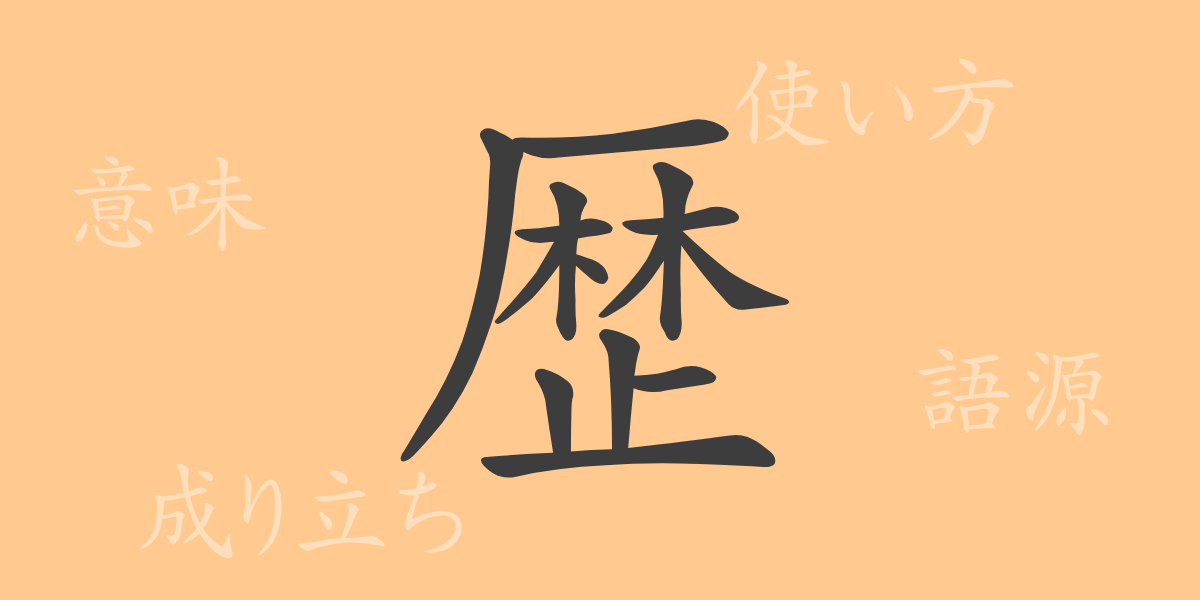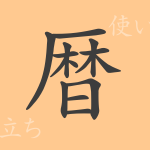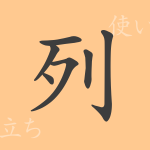Deeply rooted in Japanese culture and seamlessly integrated into our daily lives with many words, kanji (Chinese characters) play a significant role. Among them, the character “歴” (reki) is frequently used both as a unit of time measurement and as a term indicating milestones in life. This article shines a spotlight on the character “歴” (reki), exploring its origins, meanings, usages, and even the idioms and phrases that incorporate it.
Origins of 歴 (reki)
The kanji “歴” (reki) has historically been used to signify the accumulation of time and experiences. Tracing its etymology, it is believed to have developed as a character associated with the act of recording historical documents and timelines, thus relating to the marking of time and reflecting on the past. Additionally, in agricultural societies, it was used to indicate the progression of seasons, making it a character closely tied to people’s lives.
Meanings and Usages of 歴 (reki)
The character “歴” (reki) is used in words like “経歴” (keireki – career), “歴史” (rekishi – history), and “履歴” (rireki – personal history), representing the passage of time, continuity of events, and accumulation of experiences. It also appears in terms like “歴任” (rekinin – successive appointments) and “歴代” (rekidai – successive generations), indicating the continuity of positions or roles over generations. It is a commonly encountered character in daily life, frequently appearing in everyday conversations and business contexts.
Reading, Stroke Count, and Radical of 歴 (reki)
Given its frequent appearance in daily life, many Japanese people are familiar with the readings, stroke count, and radical of the character “歴” (reki).
- Reading: The on’yomi (Chinese reading) is “レキ” (reki), and the kun’yomi (Japanese reading) is “ふみ” (fumi).
- Stroke Count: It has a total of 14 strokes.
- Radical: The radical is “止” (shi), and it includes the component shaped like “歹” (gatsu).
Idioms, Phrases, and Proverbs Using 歴 (reki)
There are numerous idioms, phrases, and proverbs that include the character “歴” (reki). The meanings and backgrounds of these words often reflect Japanese culture and values. Here are a few examples:
- “歴史を刻む” (rekishi o kizamu): To record significant events or achievements in history.
- “歴歴として忘れがたい” (rekireki to shite wasuregatai): Clearly remembered and unforgettable.
- “歴代名人” (rekidai meijin): Masters who have made a name for themselves in history.
- “歴然たる差” (rekizen taru sa): A clear and obvious difference.
Summary of 歴 (reki)
Each kanji has its own history, and “歴” (reki) is no exception. It signifies the importance of learning from the past and the value of accumulating experiences. Through this article, we have deepened our understanding of the meanings, usages, and cultural and value backgrounds associated with the character “歴” (reki). Moving forward, we hope to continue cherishing the meanings embedded in this kanji as an important part of our language.

























